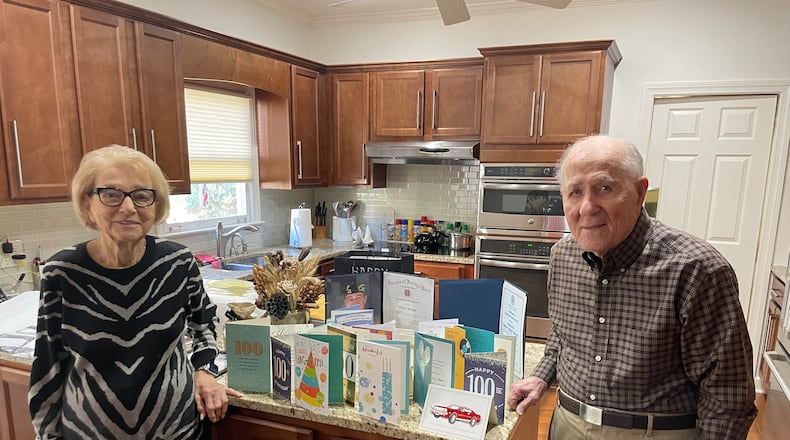Five years ago, 95-year-old Hilbert Margol offered a bit of optimism, having recently renewed his driver’s license.
The examiner “renewed my license until 2026,” he told me, flashing a grin as we sat in the parlor of his Dunwoody home. “I hope he knows something.”
Well, so far, so good. It’s 2024 and we again sat at the same table with the century mark arriving. He turns 100 on Thursday.
Margol’s gaze remains clear, his memory sharp and, although he’s a bit more bent since our last meeting, he still drives (against the advice of his children). He also regularly gets out to testify to the horror he witnessed long ago.
The retired furniture dealer is a member of the vanishing generation of World War II veterans. He has worked to keep alive the memory of what happened in the Holocaust.
On the morning of April 29, 1945 Margol and his identical twin, Howard, were part of an artillery unit fighting its way through Germany when they stumbled upon the horror of Dachau, which was the Nazi’s “model” for concentration camps.
The Jewish brothers were among the first Americans there.
At the time, the Margols’ unit was paused in a clearing and the soldiers smelled something through the woods. One GI thought it had the odor of an industrial complex. But Margol’s brother said it reminded him of when their mother seared a recently killed chicken with a gas flame to remove the remnants of feathers.
The brothers came upon the camp with dozens of railroad boxcars outside. Upon examination, they found the cars filled with decomposing skeletal bodies, many with their eyes or mouths open — the yield of the Nazis’ industrial genocide.
Then they followed some infantrymen into the camp that had the slogan “Arbeit macht frei” (work sets you free) on the front gate. The camp was eerily silent. The Germans had largely fled the camp and the 32,000 remaining prisoners, most of whom suffered from a typhus epidemic, had been told to remain inside the dozens of barracks.
The dead, Margol recalls, “were stacked like cordwood.” The Germans had run out of coal, leaving the crematorium inoperable.
Having served for months near the front in a combat unit, the Margols were used to seeing death. But not this.
“We just did not understand what we were seeing,” he told me. He said Americans knew about the Nazis’ virulent antisemitism and atrocities. But it was difficult to comprehend the scale of what they were witnessing.
The Margols could not stay long. They had to hurry back to their Howitzers. They took a couple of photos.
Credit: Bill Torpy
Credit: Bill Torpy
Later, dozens of S.S. troops in the military installation adjoining the camp were summarily executed by GIs and camp prisoners.
The Margol brothers later returned to their native Jacksonville, Florida, went to college and sold linen, silverware and pots and pans door-to-door.
He married his wife, Betty Ann, and last year celebrated their 75th wedding anniversary (probably a more rare accomplishment than flipping the odometer at 100).
After the war, the Margol twins got into the furniture business, often shifting their products, locations and focus.
“Even if you have a successful business, if you don’t change, you have 10 years to live,” said Margol.
He opened a large store in Atlanta on Marietta Street called the “Giant Furniture Warehouse.” The Margols advertised on Ted Turner’s fledgling television station and the future media mogul enjoyed their schtick. “Mama got two for one!” was one of the identical twins’ ads.
The business eventually grew to 75 stores in numerous states. They later sold the stores, although Margol remained active in business until he was 93. Staying busy, no smoking, limited drinking and a little walking are a few of the ingredients to an extended life. But Margo figures it’s mostly luck. “I got my mother’s genes,” he said. “She lived until 102.”
Howard died at 92.
Like many World War II vets, Margol didn’t talk much about the war. There were lots of vets — some 16 million Americans served in the war — and they all had stories. Perhaps 100,000 WWII vets are alive today.
It wasn’t until he was a senior citizen that Margol and his brother went public with their long-ago experience. The fact that the Dachau ”liberators” were Jewish, as well as twins, certainly added to their renown.
His recollections have been recorded at museums, universities, history centers and in numerous presentations and interviews.
Late last year, CNN featured him on prime time talking to an auditorium full of kids at St. Pius X High School. In that broadcast, he said antisemitism was as bad as he could recall.
I’ve heard Margol’s stories before, but there is a certain chill that comes with someone who was actually there at Dachau describing his shocking and numbing discovery.
Why does he keep telling it? Well, getting out there does keep his mind sharp and as someone who was there, he believes in the adage of “Never Again.”
“I hope and pray,” he said, “that the offspring of the Holocaust survivors and those who hear my voice outlive the offspring of the deniers.”
About the Author
Keep Reading
The Latest
Featured





